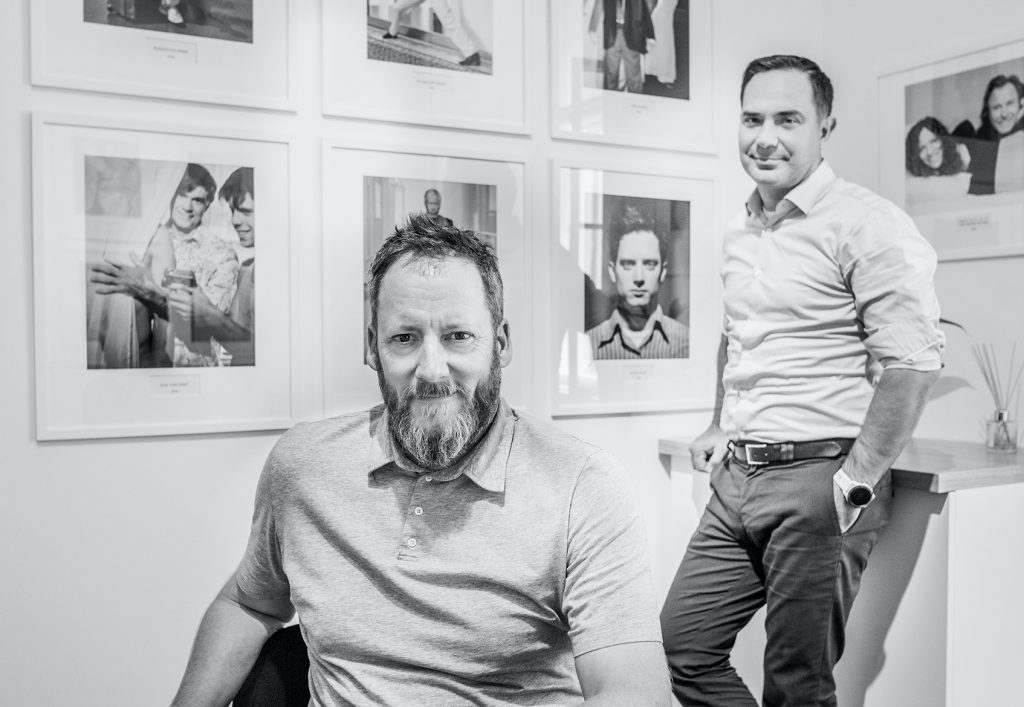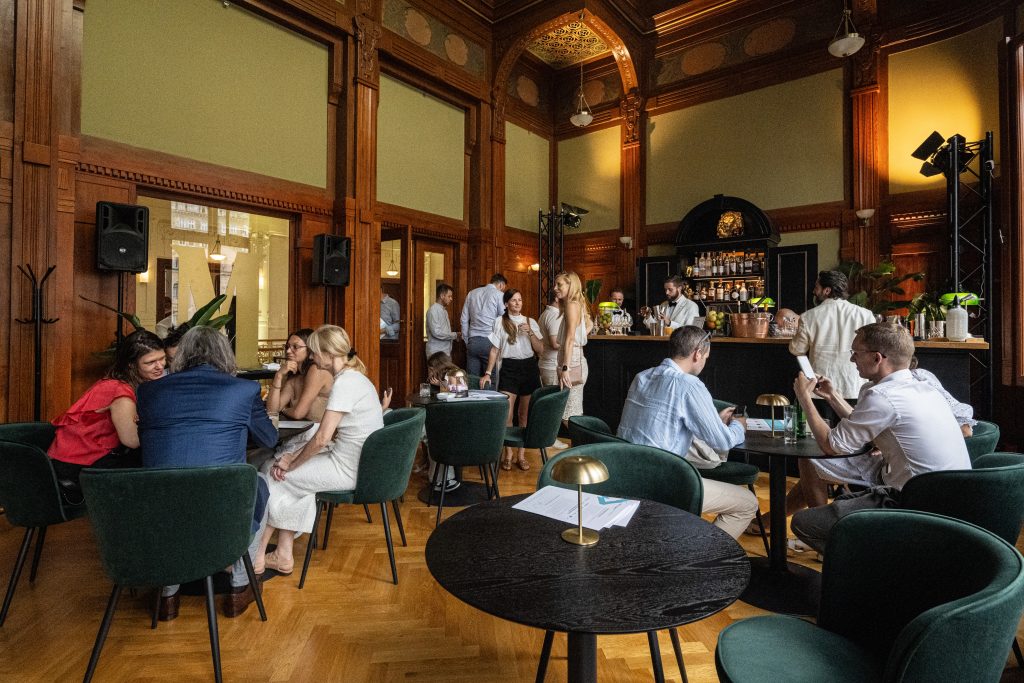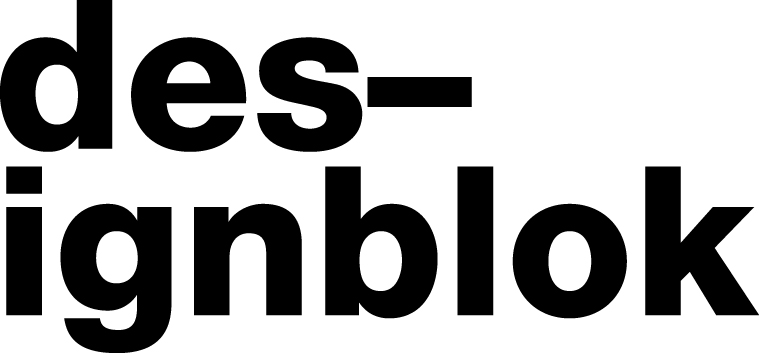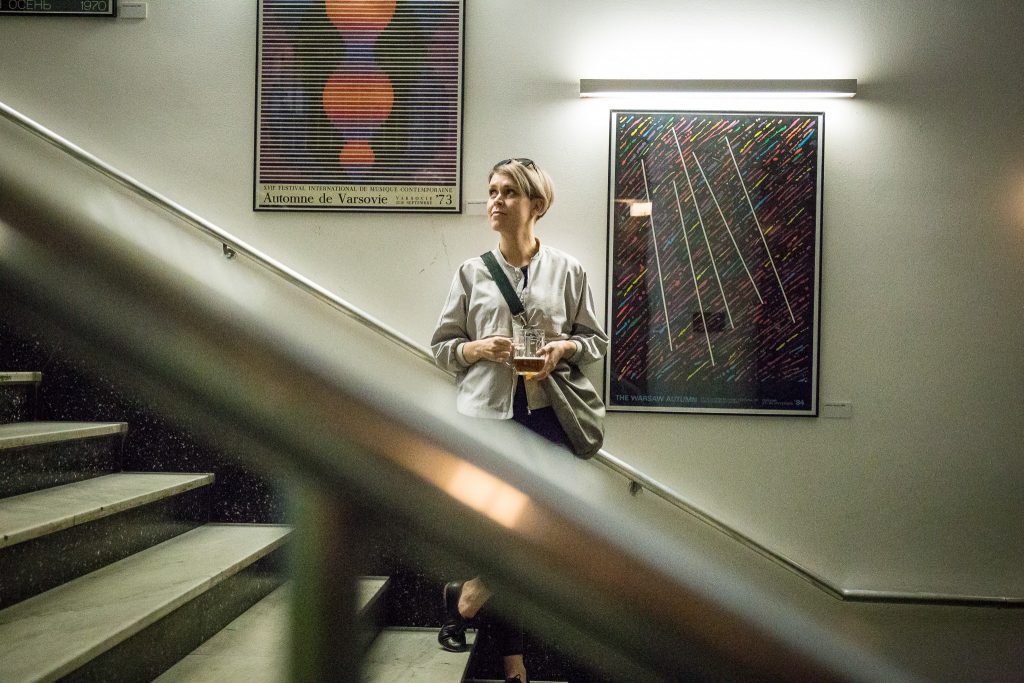All newsInterview: Covid showed the festival’s importance for Karlovy Vary

A double interview with the executive director of the Karlovy Vary film festival, Kryštof Mucha, and Rockaway investment partner Jan Jírovec about the upcoming 55th festival, the future, and the connection between Rockaway and the biggest cultural event in the Czech Republic.
Both love films, both have a passion for golf, both believe that Karlovy Vary has the potential to host more events like the International Film Festival, and since this spring, when Rockaway Capital invested in the festival, both are also on the board of the company putting on the festival.
In recent weeks its executive director Kryštof Mucha (on the left in the photo) and Rockaway investment partner Jan Jírovec (on the right) hunkered down in the festival’s offices in the centre of Prague, and together with the festival’s president Jiří Bartoška and the entire team worked hard to ensure that the festival, which this year will exceptionally take place on August 20-28, after skipping a year due to the Covid-19 pandemic, will return in its former glory as we all remember it.
What are you looking forward to the most?
Kryštof: Mr. Bartoška always says that he looks forward to having duck on Sunday at the Embassy Hotel, which is always the day after the festival ends. I get what he means by that, but I on the contrary look forward to the week prior to the festival, which is for me is the nicest moment. I like packing my bags on Friday a week before the festival, leaving for the Pupp Hotel, and enjoying the last quiet weekend, which is reminiscent of the calm before a storm.
Jan: I’m mainly looking forward to the festival being put on at all. I’ve been coming to the festival for a long time, plus during the last five years as the main partner’s representative, so it’s always been special for me, but this year it’ll be different for two reasons. For one, the festival is back after missing a year, and then I’m really looking forward to being part of what’s going on behind the scenes for the first time. I had a bit of a taste in past years, and it was always something indescribable. I can already see it now in the festival’s offices, which are buzzing with a specific kind of stress and adrenaline.
Kryštof: And that’s precisely what makes the last weekend before the festival beautiful. The buzz dies down, you’ve got time to stop for a bit and get things straight in your head, because on Monday everything starts up again and can no longer be stopped. But this year will be special for me because I’m looking forward to the festival’s opening even more than usual, as it will start with a film that I’ve been working on for the past twelve years.
Zátopek.
Kryštof: Yes. I’m looking forward to the fact that people will finally see it, and I’m confident that it will work as well as during past viewings.
What will be different at the festival this year? Aside from the unusual August date, of course.
Kryštof: The average visitor will of course see that something is different, because we’ll have to follow lots of anti-pandemic measures. We’re doing everything to make sure that we know that everyone in the theatre has either been tested, had Covid, or been vaccinated. So in this respect the festival will definitely be different. On the other hand, as of August the government repealed attendance restrictions on indoor events, so we’ll be able to make use of 100 percent of theatre capacities, and after many years the pool on top of the Thermal Hotel will be open again, which will hopefully make up for all those measures.
Jan: As you already said, the August date is unusual, perhaps it will get cold earlier in the evening, but film festivals are primarily about films, and thanks to our programme team, these will be absolutely top-notch. In other words, the whole team is doing everything it can to make it a full-scale festival from the perspective of films shown, partner events, and the attendant programme. So we’ll see if it’ll be different. Covid will of course affect it in some way, but Petr Lintimer, our production head, and his team are doing everything they can to make sure that this won’t show up anywhere else.
Kryštof: We already experienced this at the beginning of July at the festival in Cannes – there were less people there, of course, because not as many film industry people came from abroad, and that will be similar in our case too, but on the other hand the atmosphere in Cannes was amazing, because you could feel how much everyone wanted everything to finally be normal again.
Is how the festival in Cannes went after the pause due to Covid some sort of example for you?
Kryštof: Cannes was extremely important for us, because we knew that they’re right before us, so we were interested in how they’d approach it. Cannes of course has a huge advantage in that France really pampers its film festival. Most if it is financed from public funds and the rest of the money is provided by partners like Air France, Renault, Nestlé, or L’Oreal. So companies almost have an obligation to be there. Plus the festival received an exception from the French ministry of culture so that guests from Britain or the United States, for example, could come during the festival.
And what kind of feeling did you get when you were there?
Kryštof: Everything was smaller, more modest, because roughly 20 thousand Americans weren’t there, but that’s precisely why the atmosphere was so amazing, because everything was like back in the old days in Cannes. Suddenly there weren’t crowds of people in front of every restaurant and you didn’t have any problems finding a place to sit, the theatres were full and even small ones where you normally wouldn’t go were showing films. It was perfect.
On the other hand, everyone agreed that they’ll be glad when Cannes returns to its usual May time slot.
Kryštof: That’s true. At the start of the summer the tourists that have been coming there for summer vacation for decades, French people who always spend the summer there, and festival guests were suddenly all there at once. Two important seasons collided. That’s why next year Cannes will once again be in May. And we hope that Karlovy Vary will once again be at the start of July.
So the end of August is just temporary for Karlovy Vary?
Kryštof: Yes. The August date is due to the fact that top festivals like Cannes, Venice, and Berlin as well as other festivals like San Sebastian or Locarno had already set their dates and we had to adapt. I must say that some people even like the August date, but otherwise KVIFF’s place in the calendar will always be at the start of the summer holidays.
The Karlovy Vary festival survived 2020, when it couldn’t take place due to the Covid-19 pandemic. Can that have a negative effect on the festival in the future?
Kryštof: Instead of a traditional festival we created the KVIFF at Your Cinema project, where we screened films at 96 theatres across the Czech Republic. Thanks to our partners, the Ministry of Culture, the regions, and the town, we managed to survive the year in relatively good health, so in the end it was beneficial for us, because the screening project showed us a lot. But we wouldn’t want to repeat it long-term. The idea that there wouldn’t be another festival could start being a problem from our partners’ perspective. We saw that a year without the festival opened people’s eyes, because they realized what they were losing out on. And I think that most of them, and by this I primarily mean people from the business community, really do feel that way. The question is how it will affect the whole town in the end, if it will have some sort of tangible effect.
Karlovy Vary, along with Prague, probably felt the impact of the pandemic the most in the Czech Republic. Do you think that the festival will give the the whole town a boost to get it back on its feet?
Jan: You’re right that Karlovy Vary now has much fewer tourists, just like Prague and other places. The town mainly has to take matters in its own hands, because this year the festival is taking place toward the end of the main summer season, so it’s clear that this year the town will be affected. Whether they take it as an opportunity to entice different types of guests or visitors from the Czech Republic is primarily a question for the town and the hotel operators themselves. We, as the festival, will do everything we can to raise the profile of Karlovy Vary. I think that the town deserves it, which is also illustrated by its recent addition to the list of UNESCO world heritage sites.
Kryštof: I agree. This is actually also an effect of Covid. Thanks to what happened we managed to finalize Rockaway’s investment in the festival and that they guys, led by Jan here, have from the very beginning declared their interest in Karlovy Vary and the Karlovy Vary Region. People from town hall and the region are hopeful, because now we’re collectively saying what we were already convinced of earlier, that Karlovy Vary and the Karlovy Vary region have huge potential. And this is illustrated by our first joint project, which will be implemented after the “big” festival, which is our project with the Czech Philharmonic. We met with a couple of partners and all it took was one meeting to convince to join us. So we feel that Karlovy Vary and the region have a huge opportunity to do something new, something that will have a much stronger foundation than Russian tourists, if I were to say it lamely.
Jan: Rockaway invested in the festival primarily because we wanted to support and develop the most prestigious event in the Czech Republic. So when we were talking about whether something will change, from the perspective of festival preparations nothing is changing, it continues to be fully under the control of the existing team, and our joint objective is to always do it as best we can. At the same time it’s necessary to emphasize that the KVIFF is such a big event that that is important not only for the region but for all the entire Czech cultural scene, that it can’t do without partners. It’s not a case of Rockaway’s here and all is taken care of. We’re prepared to support new projects and ensure the festival has stability, but synergy with partners, the Ministry of Culture, and the town has been key for the festival for decades, and continues to be so. The festival depends on its partners, which is why I’m happy that this year four new brands are supporting it.
Kryštof: I agree, and am very happy that none of the major partners left, they all stayed and if anyone left, it was one of the smaller ones. Otherwise everyone stayed, and so we’re continuing to work with companies that in many cases have been with the festival for more than 20 years.
Jan, investing in something that at the time couldn’t even be held, in the middle of the uncertainty caused by Covid – that required a lot of courage on Rockaway’s part, didn’t it?
Jan: The whole investment wasn’t finalized until this past spring, but we’d already discussed the entire thing with Mr. Bartoška and the festival’s top management the previous spring, and of course the entire time we also analyzed the various risks it entailed. In short, we believed that it’s an event for the next decade, not just the next year. There was some risk, of course, but on the other hand we were attracted by the opportunity to do it right now, when the festival needed support, plus by the opportunity to explore what else we could think up so that we could grow and be successful in other activities as well.
So for practical purposes this marriage is occurring during the most hectic period, right before the festival opening?
Kryštof: Jan, and consequently all of Rockaway, already had a connection to the festival in recent years thanks to our partnership with Mall, and so were familiar with its preparations. So we already knew them a bit. But now they of course see everything in greater details, but as Jan said, they don’t interfere with the biggest details during preparations. It’s extremely important for the festival that the guys are giving them the security of knowing that there’s someone strong there with us even during hard times, someone who will help us stabilize the festival and so we can also develop things about which we’ve often been talking, but weren’t capable of implementing. Suddenly we have the opportunity to focus on ideas that have potential and make sense, which is amazing.
One of them is the KVIFF.TV platform. How can it help the festival?
Kryštof: What KVIFF.TV can do for the festival is probably a subject that would deserve its own discussion – in any case, we see it as having several levels. To a certain degree, it’s a substitute for the classical printed festival daily paper. We call it KVIFF Live, and I’m confident that in the future it will be the only thing that you’ll need while at the festival to keep abreast of what’s being shown and what’s going on. A large and skilled team is working on it, and we want to show it to not only festival guests, but also to people who might not be at the festival at the moment, to entice them to attend next year. At the same time, we feel that similar large platforms lack a curated art film programme. When the festival ends, people suddenly start asking where they can see a film that they liked at the festival, and now it can’t be found. And we want to be the platform that grants these wishes. At the same time, we want to be educational, which means that we see opportunity in KVIFF.TV for various specialized programmes or original content. There are many questions as to what KVIFF.TV could do, and ways it could do it, so right now I can’t really describe it all.
Jan: We said to ourselves that KVIFF.TV is a bit of a start-up project, which we won’t fully present until sometime at the end of the year. It’s being worked on by a unique team led by the festival’s programme director, Karel Och, which is an advantage for us. We very quickly put together the team and the entire platform, which we want to gradually spread throughout the region, but first we need to try it all out and test it which is what we’re doing right now. For now we’re working on the full version internally, and will present it in a few months.
But Rockaway’s involvement with the KVIFF is not just about the festival – it should go much further. Can you already tell us something specific about it right now?
Jan: Kryštof already talked about it a bit. We realized that we have a team here enormously skilled in creating a large festival, one that knows everything about ticketing, how to take care of VIP guests, partners, and so on, and so we decided to make use of the team during the rest of the year as well, outside of the film festival. That’s why we’ve started a joint project with the Czech Philharmonic, which we will present in November in Karlovy Vary, and which will have a connection with films and the entire KVIFF team. We want to broaden this event significantly in the future to turn it into another major cultural event. Plus we’ve prepared another three or four events outside the film festival and the philharmonic. We’ve made a lot of progress already, but on the other hand we want these to be excellent events that are unique in some way and will last, so we’re not in a hurry. We don’t want it to be about some sort of quick event agency. We want to create our own events for the next several years, and thus put Karlovy Vary and the entire region back on the cultural and social map.
Kryštof: Both the town and the region are thrilled by it, I think that everyone senses that Karlovy Vary really needs this. After all, we were calling for something like the festival for some time now, because it will help the entire infrastructure as well as people that as a result can open interesting restaurants and establishments in the town. In Cannes, for example, there is some sort of event going on 300 days in the year. There are music festivals, trade fairs, and so on. Karlovy Vary is ideally suited for this. The highway to Prague is being completed, there’s an airport, the German border is nearby, and the town itself is beautiful. We kept on waiting for the town administration to do something, but this is the best solution – we’ll come up with the events ourselves. And thanks to the guys from Rockaway, suddenly we have the feeling that it’s really doable.
Lets return to the festival. Do you have some ideas on how to make the festival even better, and for example take some inspiration to the aforementioned festival in Cannes?
Kryštof: When I went to Cannes for the first time, I said to myself that I mainly have to look at how to do things so that one day we can be something similar. But when you really do go there, you realize that the one thing you don’t want is to be like Cannes. It’s a beautiful and excellent festival, but at the same time it’s quite specific. It’s on the French Riviera, where rich people are used to spending time, so the festival itself is therefore absolutely glamorous, because the super-rich go there on vacation anyway. The festival itself is an intellectual affair, but is accompanied by additional film business, including B and C films, which is something we don’t want in Karlovy Vary. That’s because our festival is completely unique in that absolutely anyone can come to see a movie, and yet there’s an excellent programme, excellent films, plus Hollywood stars like it. Our task is to protect this, because the KVIFF has a fragile atmosphere. It’s one of the most important events in the country that’s been here since 1946, it even survived Communism, and we have to maintain it for coming generations. That’s why I’m so glad that Rockaway has invested, because I sense that their support will be long-term and we don’t have to be afraid that another crisis will come along and we’ll lose one of our partners, for example. It gives us certainty that we can build on.
Text: Pavel Kalouš



